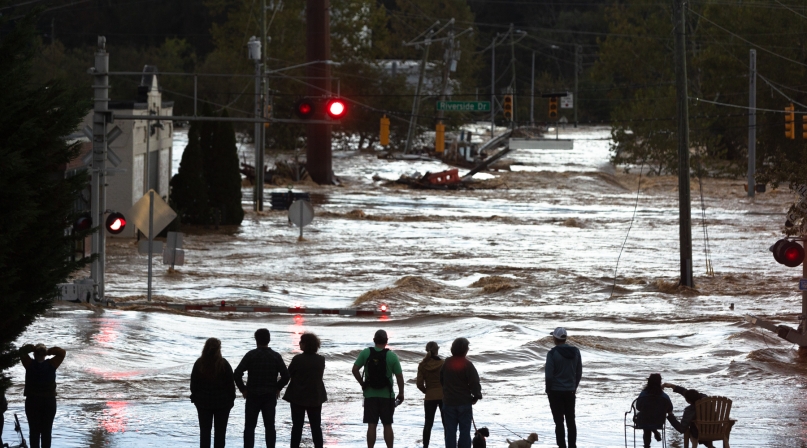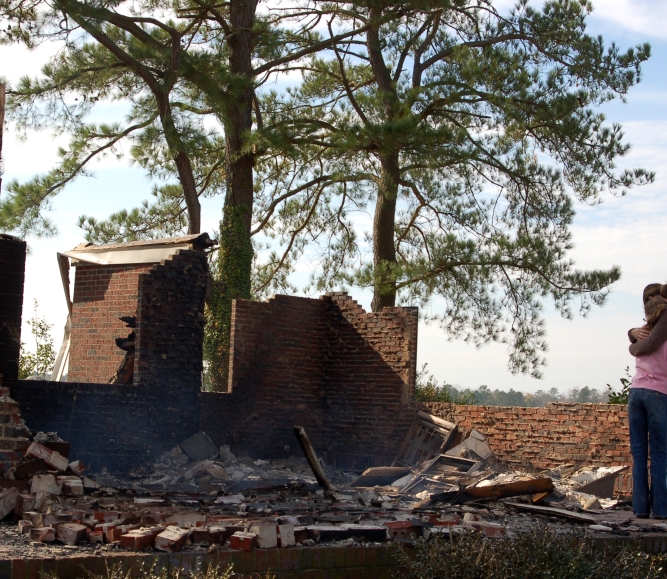Counties dig out from deadly Hurricane Helene

Key Takeaways
After a week, the days were washing together for Kristi Pukansky.
Even before Hurricane Helene started pouring rain onto Watauga County, N.C., the county’s emergency management planner was helping respond to flash floods just three days prior to Helene’s arrival.
“We had actually an EF 1 tornado touch down in the Blowing Rock area on Wednesday night (Sept. 25), so we really have been reeling from weather from that point forward,” she said. “We’re going nonstop — working, sleeping, working, sleeping.
Do more
A variety of avenues exist for donating to relief funds, but the most reliable way is to look organizations that have been vetted by government entities or at run through chambers of commerce
“We knew coming in that this was going to be a once-in-a-century event.”
Watauga County was one of several Appalachian Mountain counties severely flooded by Helene.
With more than 200 confirmed dead nationwide as of Oct. 3 and hundreds more missing nearly a week after the flooding began, Helene is so far the second deadliest tropical storm in the last half century, after Hurricane Katrina.
That death toll includes two North Carolina county sheriff’s deputies — Jim Lau, a Macon County courthouse security officer, whose truck was washed away and an unidentified Madison County deputy.
In addition to high and fast-moving flood waters, fallen trees, mudslides and washouts have devastated transportation networks, with some counties tracking more than 200 roads interrupted and interstate travel cut off in some places between North Carolina and Tennessee. Water systems have been interrupted, prompting boil advisories throughout the region and necessitating water deliveries.
Counties have been coordinating shelters, food and water distribution, information and making efforts to vet or refer people to donation managers. Watauga County, for example, has coordinated with the Boone Area Chamber of Commerce Foundation for Hurricane Helene Relief Efforts.
Nearby Buncombe County, home to Asheville, has been the epicenter of damage in North Carolina, with 61 confirmed deaths as of Oct. 2. Several counties are lending their dispatchers to help supplement Buncombe County’s 911 Call Center staff, including New Hanover, Stanly and Wake counties.
Buncombe County’s Register of Deeds office is coordinating local volunteers to perform wellness checks, for which the county has received more than 12,000 requests for the county of nearly 270,000 residents.
County Manager Avril Pinder said that early assessments haven’t indicated significant damage to county facilities, though those assessments have been secondary to prioritizing service delivery to residents. But the calendar was on her mind.
“In a couple weeks, we’ll have an election, so we’re also working on making sure we have the facilities that are early voting sites,” she said. “That is our first priority as we go back to assessing county operations. The first priority would be making sure early voting sites are ready and available. We’ll start working on getting our poll workers trained.
“Operations still have to happen even though [we are] in the middle of a disaster, so we’re trying to split our team. We’re so grateful to our state partners to send crews in from across our state, across our nation now to help us, so that we can get our teams back to doing the work that they’d normally be doing.”
MaryAnn Tierney, who is FEMA’s regional administrator for Western North Carolina, toured Buncombe County and said that currently, safety is the agency’s top priority.
“The recovery is going to take a long time, and FEMA will be here for the duration of the response and the recovery,” she said.
In addition to FEMA assistance, 1,000 active-duty soldiers have been deployed to North Carolina to help state, local and federal recovery efforts.
Across the Great Smoky Mountains, Unicoi County, Tenn.’s EMS department lost four of its five ambulances while responding to calls during the storm. Northwestern Emergency in Ashe County, N.C. has offered three of its ambulances on an indefinite lease.
“It’s a huge impact,” Unicoi County EMS Chief Anthony Buckner told WJHL-TV News. “It’s getting us back up to where we need to be to sufficiently serve the citizens of the county. Of course, we’ve got increased call volume with taking patients out of the county because we have no local hospital to go to, so it’s tremendously helping us out to get back on our feet.”
Giles County, Va. suffered its second worst flooding in history but avoided injuries in large part because of how well residents heeded warnings, Emergency Services Director Jon Butler said.
“The way the communities came together and supported each other, it really has been something special to see,” he said.
Pukanksy saw similar efforts in Watauga County to great effect, particularly while communities remain isolated during recovery.
“We’ve seen a lot of neighborhoods that are checking on each other or making lists of resources of their own, not wanting to duplicate efforts,” she said. “They are trying not to tread too heavily on compromised roads, so they’re picking up resources for their neighbors, sharing phones so each household has a working phone.”
Pukanksy said that while volunteer efforts have been crucial to Watauga County’s recovery thus far, she stressed that coordinated efforts through established agencies — Samaritan’s Purse in Watauga County’s case, not only made work more efficient, but kept smaller groups and “freelancers” out of danger.
“It doesn’t make good use of their resources if somebody is gifted a certain thing and has acquitted for that, then they really need to coordinate through a volunteer service where they can be put in the best place to mobilize,” she said.
Federal update
With bipartisan support, the Senate Committee on Homeland Security and Governmental Affairs in September passed the Disaster Survivors Fairness Act, which provides FEMA with expanded authorities to better support individuals and communities recovering from disasters.
The bill would enhance FEMA’s ability to fund disaster mitigation projects and expanding support to homeowners, allows FEMA to reimburse states that implement innovative post-disaster housing solutions, bolsters development of post-disaster solutions for renters. It also would require FEMA and the Government Accountability Office to conduct studies and reports to identify challenges and improve the administration of post-disaster assistance, increasing transparency in the process.
Advocacy
Senate Committee advances Disaster Survivors Fairness Act
On Wednesday, September 25, the U.S. Senate Committee on Homeland Security and Governmental Affairs held a markup to consider 16 bills. Among them was the Disaster Survivors Fairness Act (S. 5067), legislation designed to reform federal disaster assistance programs to better support survivors, which passed out of committee with strong bipartisan backing.

Related News

Information-sharing bill could protect court workers
The Countering Threats and Attacks on Our Judges Act could provide more than 30,000 state and local judges with access to security assessments, best practices and a database of threats made against colleagues in the justice field.

California counties fight agricultural crime
Sheriffs' offices and prosecutors in California's central valley make specific efforts to prevent and prosecute crimes against the agricultural community.

After historic winter storms, counties assess response
Counties in states that rarely receive much winter weather are assessing their responses to the January storm that left many covered in snow and ice.
